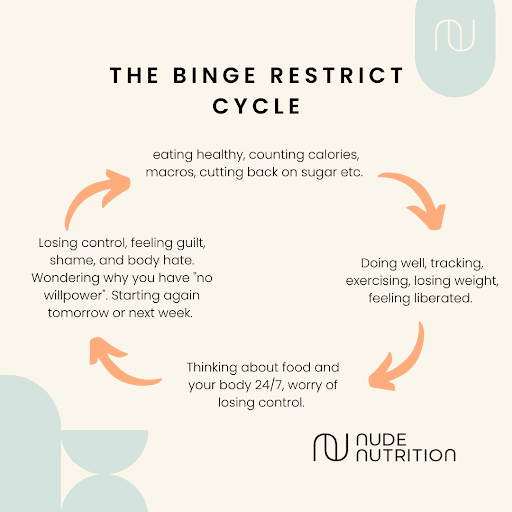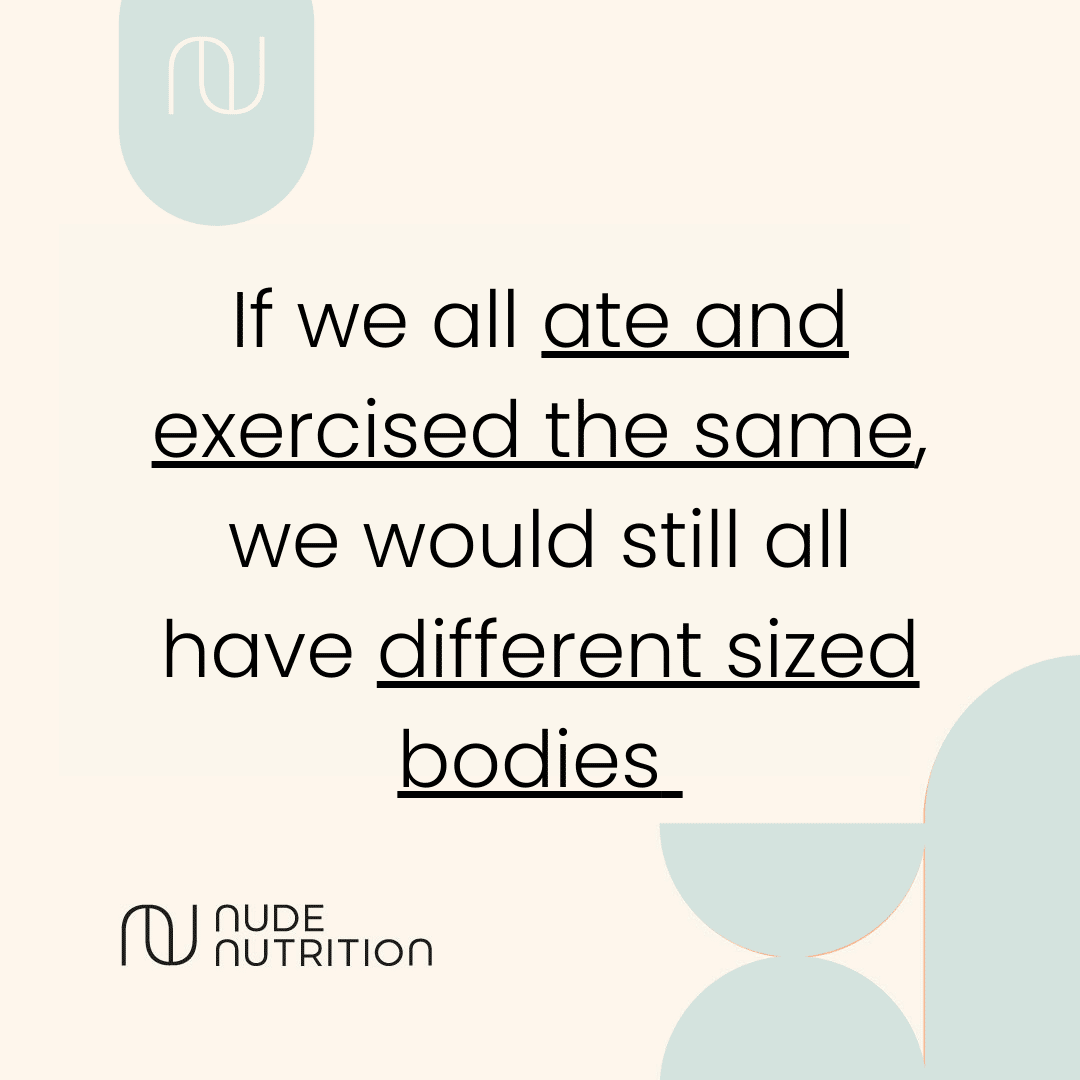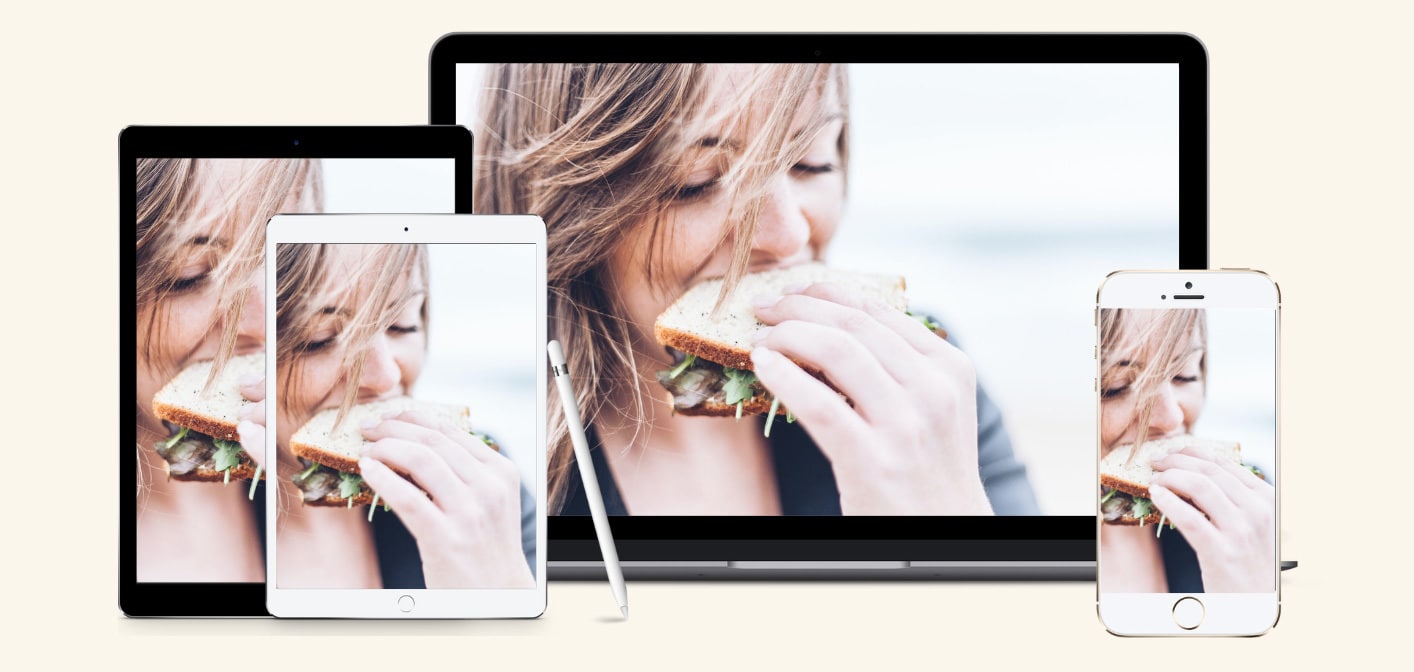Are you wondering “why can’t I stick to a diet?”. If so, you’re not the only one. I have worked with countless clients who feel a sense of despair, helplessness and exhaustion when it comes to dieting.
So, why exactly are diets so hard to stick to? The narrative around dieting is that when we can’t stick at it, it’s our personal failure…we lack willpower and discipline. It can certainly feel that way when face-diving into a tub of ice cream after vowing not to eat a single scoop for the next month.
“I must have tried almost every single diet out there and haven’t been able to successfully stick at one or keep the weight off in the long run”
You may be surprised to learn how research shows that usually, it’s a failure of the dieting system itself, rather than the individual on the diet that leads us to be unable to stick at it. And around 75% of those who lose weight on diets put it back on again.
Let’s take a closer look and see if you may resonate with any of these reasons why you’re left asking, “why can’t I stick to a diet?”
7 Reasons why you can’t stick to a diet
1. Diets can make us feel out of control and cause “backlash eating”
Usually, when we embark on a diet, the underlying belief is that the diet’s rules about what, how much and when to eat will help us have control over our eating, and thus help us lose weight.
Sound familiar?
The reality is usually the opposite. Often there is a honeymoon period on a new diet where we are able to stick to it perfectly for a few days or even weeks. But after a while feelings of deprivation inevitably set in, leading to intense cravings that are hard to resist. We can group this deprivation into 2 categories:
A) Physical/physiological deprivation – this is where your body is registering the fact that it is not receiving enough calories to survive long-term. It sees this as a threat to your survival. It then ramps up your hunger hormone, ghrelin in an attempt to get you to eat more adequately. You’re also likely to experience increased brain space/thoughts being taken up by food in your brain’s attempt to get you to eat.
B) Psychological deprivation – this comes from when we are told by diet rules that we can’t or shouldn’t eat certain types/amounts/groups of foods. As humans, when we are told we can’t do something, we naturally think about it more and feel tempted to do it. For example when someone says “don’t look down”.
The deprivation that comes from dieting is a powerful force. And for good reason. Our biology is set up to ensure our survival and most modern diets do not allow adequate nutrition to ensure long-term survival. Therefore our bodies have our back and we are neurologically, psychologically and hormonally wired to NOT diet. Of course, this can be extremely frustrating if you have a goal of weight loss. However, there is another way to feel in control of food, nourish yourself and maintain a healthy weight. It’s a framework we teach our clients called Intuitive Eating, but more on that is at the end of the article.

2. Diets can make us want to rebel
As adult humans, we have a natural desire to have autonomy over our actions. When we have food rules placed on us, even if we place them on ourselves by embarking on a diet, our brains naturally want to rebel against this. Therefore, many people on diets may break the diet rules as a subconscious form of rebellion.
3. You can’t stick to a diet because they’re anti-social
Diets are usually anti-social. Take this example…you’re following a low-carb diet and you receive an invite to a dinner party with some friends. You find out that the menu for the evening involves pasta and pudding. You have 3 choices.
A) you go to the party and try to avoid carb meal components (which let’s face it, is kind of awkward).
B) you don’t go at all
C) you go to the party and decide to have a “cheat night” off of the diet. But you know from past experience that breaking the diet rules can lead to a spiral so don’t really want to risk this.
Options A and B can really interfere with our sense of social well-being. Humans are social creatures. Evidence shows that a sense of social well-being and interconnectedness are just as important for our health as diet and nutrition. So if a diet keeps us from our social life…it just isn’t going to be a) good for us holistically or b) sustainable in the long term.
Your way of eating ideally needs to fit in with your life to be sustainable. Not the other way around.
4. Diet often focus is too heavily on weight loss, instead of health and wellbeing
Weight is not as much under our individual control as we are led to believe. We may be able to effectively manipulate weight in the short term but in the long-term genetics have a large role to play. In fact, studies suggest that up to 70% of human body weight is determined by genetics. More on that in this article all about set-point weight.
The diet industry relies on the false narrative that if we only eat and exercise right, we can make our body look any which way.
The fact is, if we all ate and exercised the same, we would all still have different-sized bodies.
Weight is not a behaviour, therefore we can’t directly control it. What we CAN directly control are our health behaviours…how much sleep we get, how we move our bodies, our nutrition, our social relationships, and our stress management. THESE are the things we want to focus on.

A heavy focus on weight loss can lead to neglecting healthy behaviours if they don’t result in weight loss. Implementing these behaviours may or may not lead to weight loss. But regardless if they do or not, they can improve your health. You see, it’s actually possible to be metabolically healthy across the size spectrum, despite what you may have been told. And if the desire for weight loss is there, that’s ok too.
5. Diets encourage “all or nothing” thinking
There is little flexibility in dieting. We are either “on” or “off” the diet. This is problematic because it encourages an unhelpful thinking style known as “all or nothing” or “black and white” thinking.
For example, you’re on a diet that forbids more than 2 squares of chocolate per day. But one day you can’t resist the urge to eat more than that (because chocolate is yum and you’re human). The diet rules encourage us to think “screw it, I’ve broken the rules now so I may as well have more and start again on Monday”. We may then proceed to bypass our fullness levels, mindlessly eating all the foods the diet forbids whilst we’re not “on” it anymore. Whereas if we weren’t dieting we might be able to approach this in a more balanced way, recognising that a bar of chocolate cannot make or break our health or body shape.
6. Diets don’t consider emotional eating
Diets rely on external rules and pay little attention to our internal worlds. Many people I work with use food to cope and comfort themselves and diets just don’t account for this.
Picture a stressful day at work and a lecture from your boss. Your thoughts immediately turn to getting home, raiding the fridge and getting a takeaway for dinner to make yourself feel better. Even if you’re meant to be “on a diet”, if food is your only way to self-soothe you’re eventually going to need to break the diet rules so you don’t implode from intolerable discomfort.
If so, this is nothing to be ashamed of. In fact, it’s very normal to sometimes turn to food for comfort. But if food is your main or only way of dealing with uncomfortable feelings, this can be harmful to your overall well-being, especially if accompanied by guilt and shame.
To combat this we need to work through underlying causes of emotional distress and learn strategies and skills to sit with and deal with tough emotions that aren’t just food.
You can read more on emotional eating in this article.
The framework I use with clients has a whole principle focused on managing emotions and emotional well-being.
7. Diets discourage us from thinking for ourselves
As we follow diet rules about what and how much to eat, we are prevented from thinking for ourselves. You will likely benefit from getting back in touch with your inner wisdom so that you can figure out which foods and portion sizes feel best in YOUR body.
Diet rules are often too simplistic and don’t teach you to get in tune with your hunger and fullness signals. If a diet plan tells you to eat a certain amount of food at lunch and you still feel hungry afterwards, your body is telling you that you need more food. But, trying to follow the plan you’re likely to try and override what your body is telling you. Another example would be if a diet suggests that you eat 3 meals and don’t snack, yet you feel hungry between meals.
Your body has a lot of information to give you about the way of eating that suits you best. But most of us need to re-remember how to listen to our bodies, especially if we’ve been dieting for some time. My clients and I work with a specific set of tailored tools to enable them to re-learn the wisdom of their body, enjoy eating and feel more in control around food.
There IS an alternative to dieting
Perhaps you’re fed up with dieting but don’t know what the alternative is. You’ll be pleased to know there IS an alternative…It’s called Intuitive Eating. Intuitive Eating is an evidence-based approach to help improve your relationship with food, have better self-control around food, and break free from the diet mentality. Intuitive eating can help you learn to honour your health by listening and responding to the messages of your body. This helps you to meet your physical and mental needs based on your terms and move away from external diet tools such as the time of day, points systems, calorie tracking, rigid rules or meal plans.
Learn more about Intuitive Eating and how to get started with it through these links:
Intuitive Eating Tips for Those Starting Out
Intuitive Eating 4th Edition (book)
And download my free 7-steps to food peace and freedom audio guide to get started.
Do you want to work with a qualified dietitian and Certified Intuitive Eating Counsellor who nurtures a good relationship with food? You can read more about what that looks like here.





